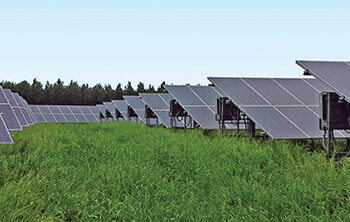Those searching out a new place to call home in Tbilisi may have experienced sticker shock at the start of March as expectations of a large influx of migrants fleeing war pushed the average rental price in the capital up 20.1% MoM and 48.4% YoY.
But are high rental prices here to stay? And how will the sales market be affected? Investor.ge looks at the current state of Tbilisi’s real estate market and how it’s being impacted by the war in Ukraine.
Initial predictions at the onset of war seemed to spell out dark days ahead for Georgia’s economy as pundits warned that exports, tourism, and remittances could all take a huge hit as the region faced both political and economic uncertainty.
The average rental in Tbilisi increased 20% MoM and 48.4% YoY in March
Despite these less-than-optimistic forecasts, analysts also noted that the economy could see a boost if war-affected migrants were to relocate to Georgia. These migrants, which number between 80,000 and 120,000, according to estimates in Galt and Taggart’s latest tourism report, could inject up to $110 million (depending on how and when the war in Ukraine is resolved) into the economy and stimulate the residential real-estate market.

Residential rental market prices surge
Any realtor or apartment-seeker can attest that the start of March witnessed a considerable influx of interest in Tbilisi rental properties. Reports in the first week of the month showed that popular real estate site Myhome.ge witnessed a spike in searches from Ukraine, Russia, and Belarus, with more than 68,000 new users from those countries using the platform in the last week of February and the first half of March.
Co-founder of Rentals.ge and Co-Chair of the AmCham Real Estate and Construction Committee, Zurab Eristavi, says that inquiries about residential rentals at his agency reached record levels in the first weeks of March: “When the war broke out, we started receiving 500 or more inquiries a week. This was more than we see, on average, throughout an entire year.”
Most common among the inquiries, he notes, were those seeking out economy price rentals. “The majority of the requests coming in were not for premium apartments but more economy flats. We do not generally offer economy flats, so we were not able to help these people, but I know that these types of flats were soon in short supply. I can say that we have higher occupancy levels than normal in the premium class market [apartments starting at $1,000 per month]- at least a 10% increase- but there is not a shortage. However, it’s almost impossible to find a centrally located apartment for $400 anymore.”
Accompanying that high demand and short supply was a rapid jump in prices, with the average rental in Tbilisi increasing 20% MoM and 48.4% YoY in March. These price hikes were most notable in central, expat-favored districts like Mtatsminda, Vake, and Saburtalo, where Eristavi says he witnessed some apartments jumping more than 100% in price from February to March. “It was not uncommon to see an apartment that previously went for $400 now being advertised for $800.”
Before the war, analysts at TBC Capital predicted that 2022 residential real estate prices would grow by 9.4%. Data from March residential sales has already pushed that prediction up to 11%
And while the main districts seemed to be the most desirable for many of the migrants coming to Tbilisi, both March and April statistics show that rental prices in the outlying districts have witnessed substantial year-on-year increases as well. TBC Capital’s Head of Research Irina Kvakhadze says this is partly due to the fact that higher prices are pushing many to seek more affordable accommodation in the outer districts of the capital: “As demand and prices for central apartments have increased, many who used to be able to afford to live in these districts have been forced to look for more affordable options outside of the center.”
“We also can’t discount that part of this is the market reacting to what it sees as an opportunity,” she adds. “Just because an apartment in Gldani is advertising prices that are 72% higher than the previous year does not mean that they are necessarily getting people to rent at that price. We do expect that this factor should stabilize in the coming months as the market adjusts to the new reality.”
So, are high rental prices here to stay? A look at the April figures on residential real estate rentals seems to indicate that the market is not slowing down. Rental prices continued to surpass their pre-pandemic levels and reach record highs, with MoM growth at 21.5% and YoY growth at a whopping 83.3%.
However, TBC Capital’s Kvakhadze stresses that price levels are highly dependent on the war situation: “because migration has a major impact on prices, they may fall if the situation in Ukraine changes.”

Airbnb market reveals migrant impact
While the traditional rental market continued to heat up in April, data from Airbnb showed mixed metrics, perhaps revealing one of the best snapshots into the migrant effect on the current market. In the month of March, when much of the war-affected migration occurred, the Airbnb market in Tbilisi saw a large uptick in bookings, with occupancy rates 31% higher than in 2019 and average daily rates up 12%.
April figures showed a slump in occupancy rates, a fact that Galt and Taggart’s Head of Research Eva Bochorishvili attributes to many migrants moving to more traditional renting agreements. “March demand was most likely due to new arrivals in the country who sought out temporary accommodation,” she explains. “Now, we see that demand is slumping.”
Also interesting, Bochorishvili adds, “is the drop in listings on the platform from March to April.” This 10.2% decrease in the number of listings from month to month, she says, “is likely due to more lucrative opportunities for landlords to rent long-term instead of on Airbnb, given the current market.”
How are residential sales prices being affected?
While some migrants impacted by the war have sought a residential reprieve in Tbilisi, uncertainty surrounding the conflict has meant that many have been hesitant to sign long-term rental contracts, let alone purchase property. However, current demand has had an impact on real estate prices that were already rising.
Before the war broke out, analysts at TBC Capital predicted that 2022 residential real estate prices would grow by 9.4% (in USD); however, data from March residential sales has already pushed that prediction up to 11%.
So, what is happening in the sales market? While not as pronounced as the growth in rental prices, sales prices in March showed MoM growth of 2% (in USD terms). April growth in sales prices was more pronounced and up 7.3% compared to the previous month. However, whether this is due to migrants purchasing property remains hard to say.
War-affected migrants, which currently number between 80,000 and 120,000, could inject up to $110 million into Georgia’s economy
G&T’s Senior Analyst Kakha Samkurashvili recently told BM.ge that one factor affecting the market is the increasing attractiveness of real estate as an investment due to high demand and rental prices. “The fact that the demand for rent has increased has a positive effect on the value of real estate as an investment product. However,” he adds “a second factor, which is the instability in the region that accompanies this process – well, this factor is working against the other.”
And this regional instability is doing more than just deterring foreign investment in the market. It’s also affecting already high construction prices. The war has had a notable impact on the prices of construction materials, and rising energy costs are making it more expensive for new real estate development, says Samkurashvili.
Rentals.ge’s Eristavi says that new building code regulations are also playing a role in increasing costs for developers. “There is a new regulation in Tbilisi that requires high rise apartments to feature two fire exit stairwells in each building. This has decreased the size of square space that is able to be sold per building and affected profitability.” All these factors – increased demand, costs of materials, and new regulations – point to rising prices for residential real estate, at least for the foreseeable future.
How high prices may go, however, depends largely on how long the war lasts and how permanent the relocation of these migrants is, says G&T’s Bochorishvili. “It’s hard to say at this point with so much uncertainty.” One thing she isn’t worried about? A housing market bubble. “I don’t see much risk of a housing bubble,” she notes. “There is an expectation that real estate prices will come up as costs rise, and this may be reflected in the rental market as well. However, if you look at the market in Georgia in recent years, we have a large supply of new construction, but we also have consistent demand.”
Commercial property deals put on hold, demand for coworking up
While housing demand has skyrocketed in the face of migration, Rentals.ge’s Eristavi says that the situation for commercial real estate is not as straightforward. “The largest positive impact we have seen on commercial properties is from co-working spaces. Many of the migrants coming here, whether it be from Ukraine, Belarus, or Russia, are working remotely now,” he notes. “So, they are in search of an immediate workspace like a coworking area.”
Rusudan Chakvetadze, Regional Manager of REGUS, a coworking company with multiple branches in Tbilisi, told BM.ge in mid-March that demand for space since the war began had gotten so high that they were unable to satisfy it: “Today, demand is up ten-fold, mostly from IT companies that have offices in Russia and Belarus. The main reason for the change of offices is the sanctions. International companies as well as local Russian and Belarusian companies are looking to rent offices for their employees who move to Georgia.”
Myhome.ge witnessed a spike in searches from Ukraine, Russia, and Belarus, with more than 68,000 new users from those countries using the platform in the last week of February and the first half of March
Eristavi says that this trend has not carried over to more traditional commercial real estate. “We had in the pipeline a number of international companies looking for 2,000 to 10,000 square meters of office space. When the war began, most of those requests were suspended or downsized, which is a direct result of fear over regional security issues.”
Despite this development, he says prices have not noticeably changed in the commercial property market. “Prices were definitely affected during the Covid-19 pandemic, however, we have not seen any drastic changes related to the war situation as of yet,” he says, noting that a resolution to the war or increased interest in relocating international companies to Georgia could positively impact commercial real estate in the coming months.
This article was prepared with the support of the USAID Economic Security Program.
By Mackenzie Baldinger for investor.ge














